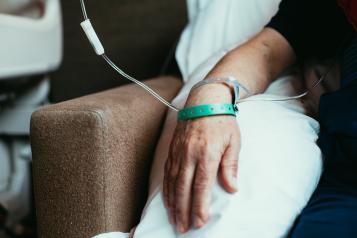New data reveals delays to cancer care

Today, the latest statistics released by the NHS indicate that people are waiting longer for cancer support, posing a risk to people’s safety.
The latest data from September 2022 indicates that more people are unfortunately waiting longer than they should for their first cancer appointment. The percentage of patients receiving their first treatment within a month of diagnosis has also fallen.
Responding, our National Director Louise Ansari said:
“The news that more people are facing delays to cancer diagnosis and treatment is highly concerning. Delays to treatment are exacerbating an already stressful and anxious experience for patients and their loved ones.”
“The NHS is under so much pressure, but it’s clear from today’s figures and the feedback we get from patients that the NHS’s plans to improve cancer care have still got some way to go. With more people being diagnosed at earlier stages, they then need to receive the quick cancer care they need. People should also be supported while they wait and get clear communication about the treatment they can expect at every step of the way."
Our evidence
- Before the pandemic, more than six out of ten people we heard from reported a positive experience of cancer services. Moreover, people tended to report a much better care experience than in other NHS service areas.
- But feedback about cancer services has got worse. Last year, under half the people we heard from expressed having a positive experience.
- People have told us about delays with getting help, screening and treatment appointments cancelled, and about getting limited information and support during and after care.
- Patients also want a stronger focus on dealing with administrative issues and poor communication that can cause real distress.
- We have also seen a worrying number of people tell us that their GP had initially misdiagnosed their cancer because their concerns were not taken seriously.
Our suggestions
- The NHS needs to double down on tackling GP access issues, the referral process and diagnosis delays that have a knock-on effect across cancer treatment.
- Better communication is also vital to ensuring people don’t feel isolated while they wait for diagnosis and treatment.
- Earlier diagnosis must be improved. Early diagnosis helps give people certainty and helps the system to prioritise and most effectively use its limited resources.

